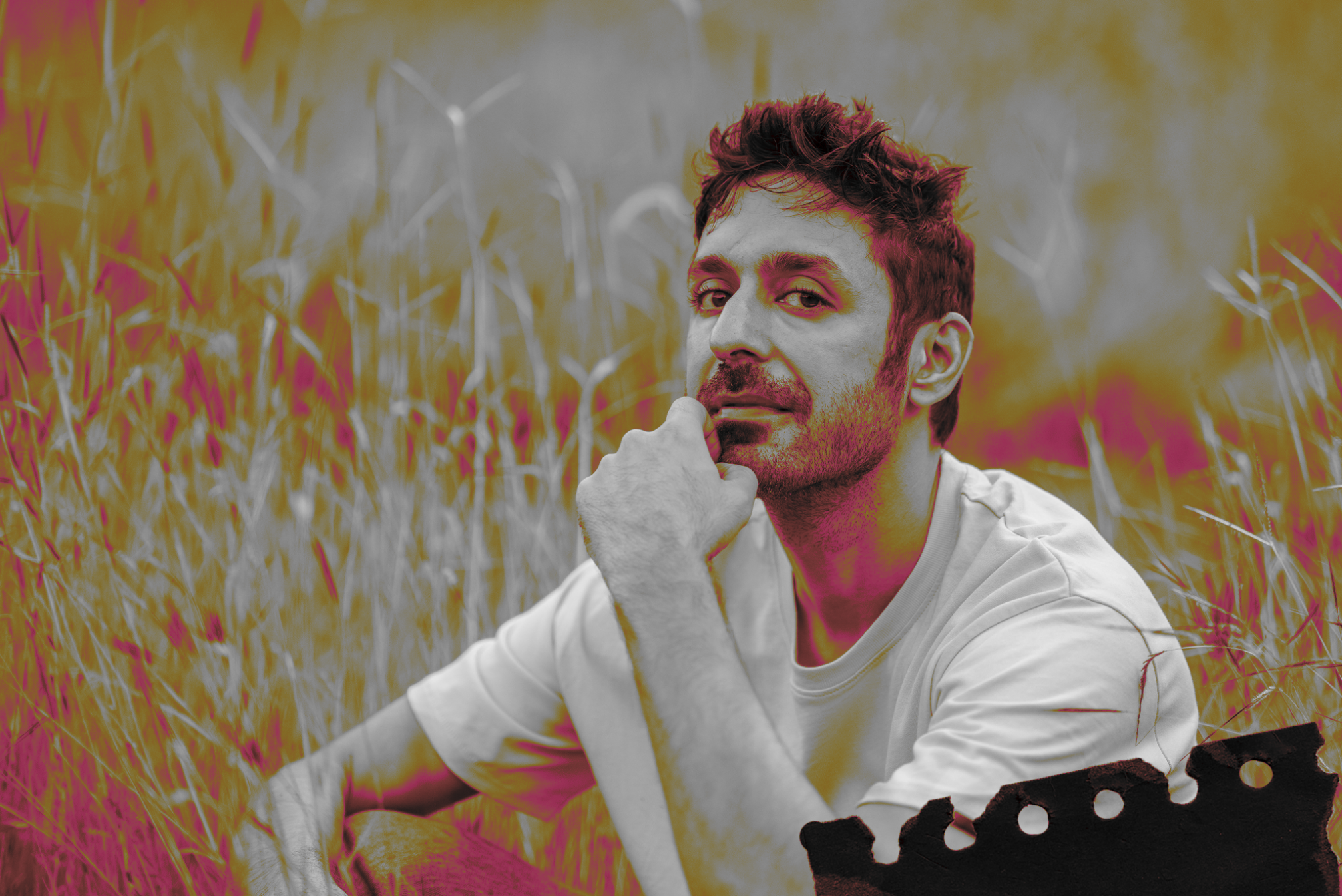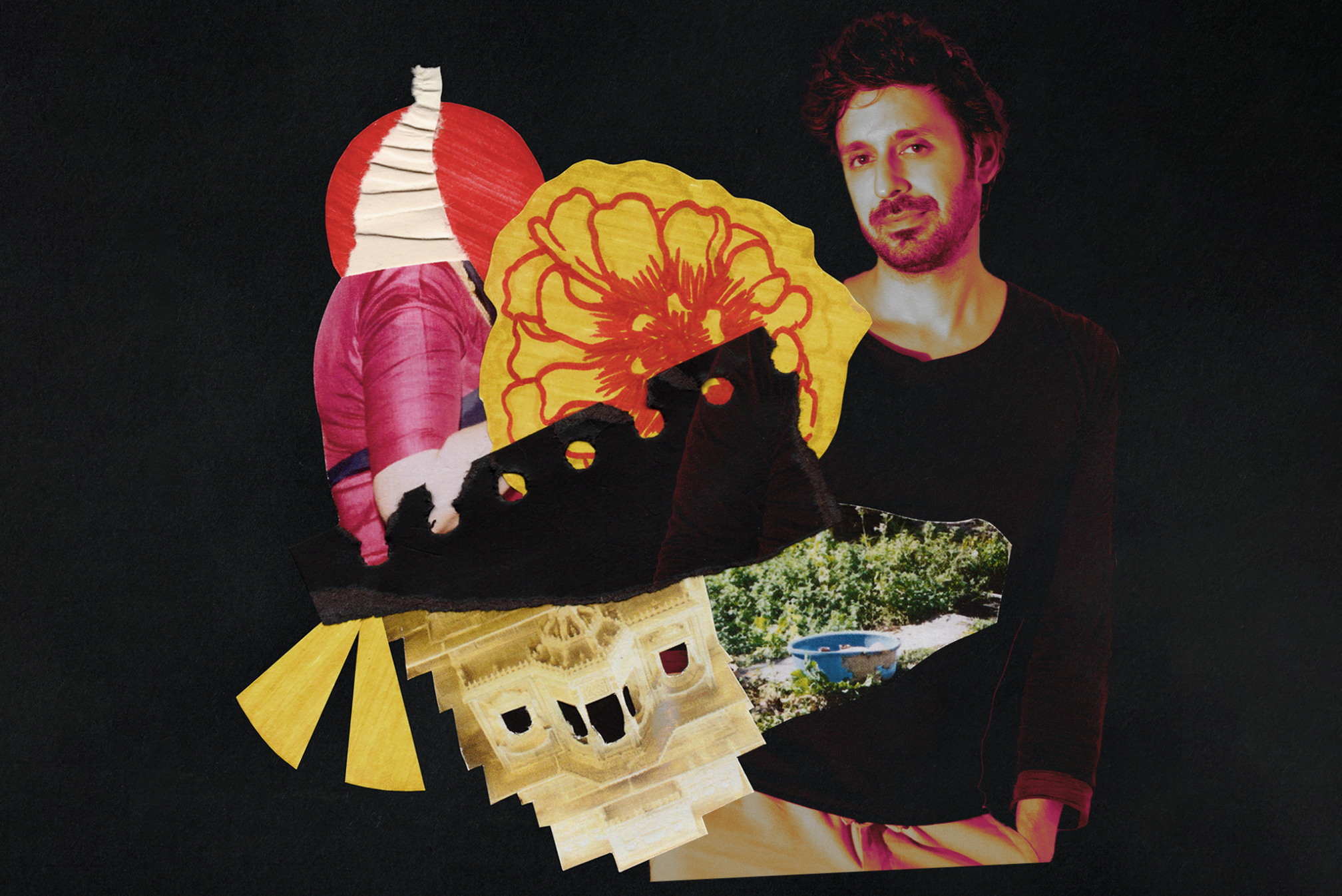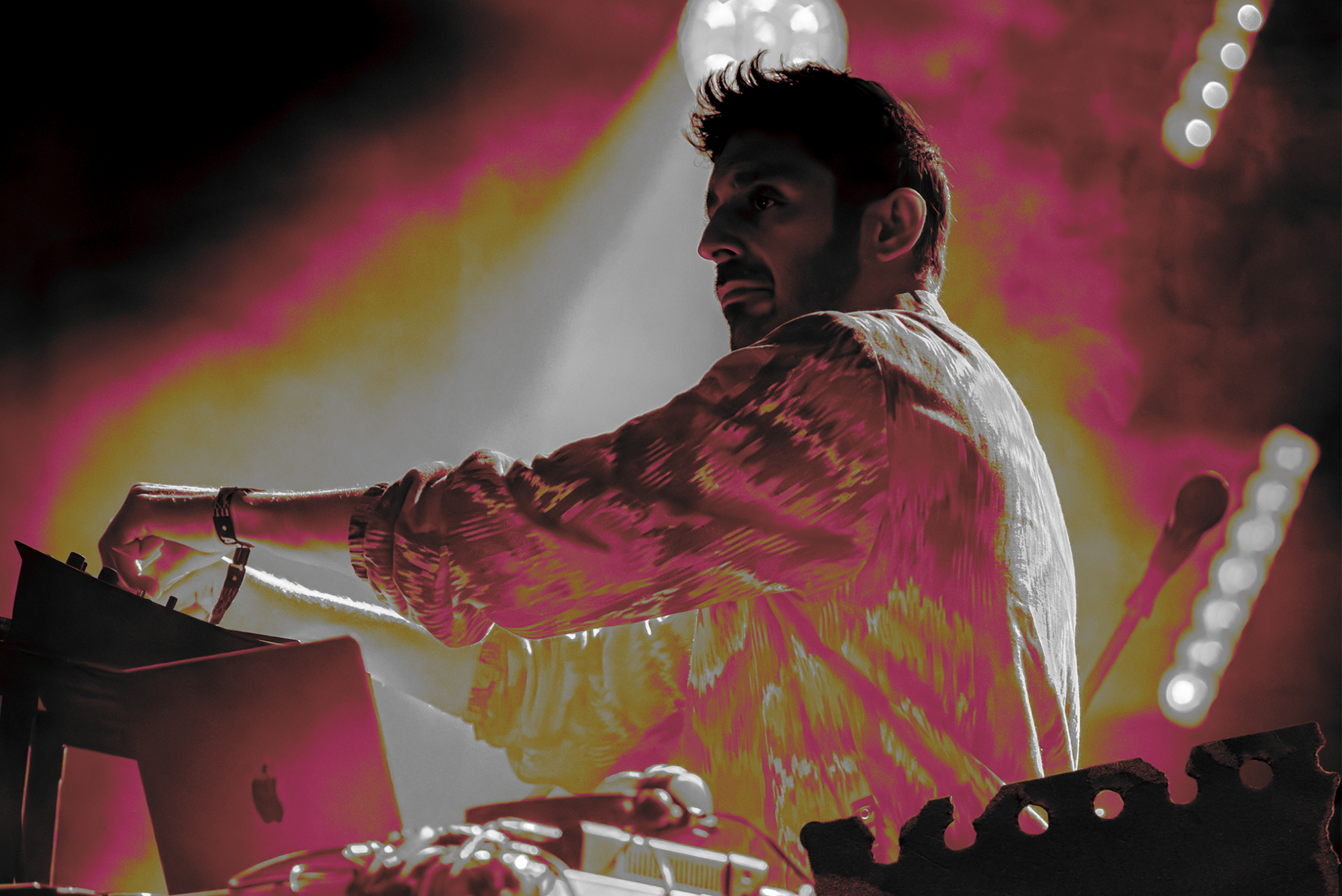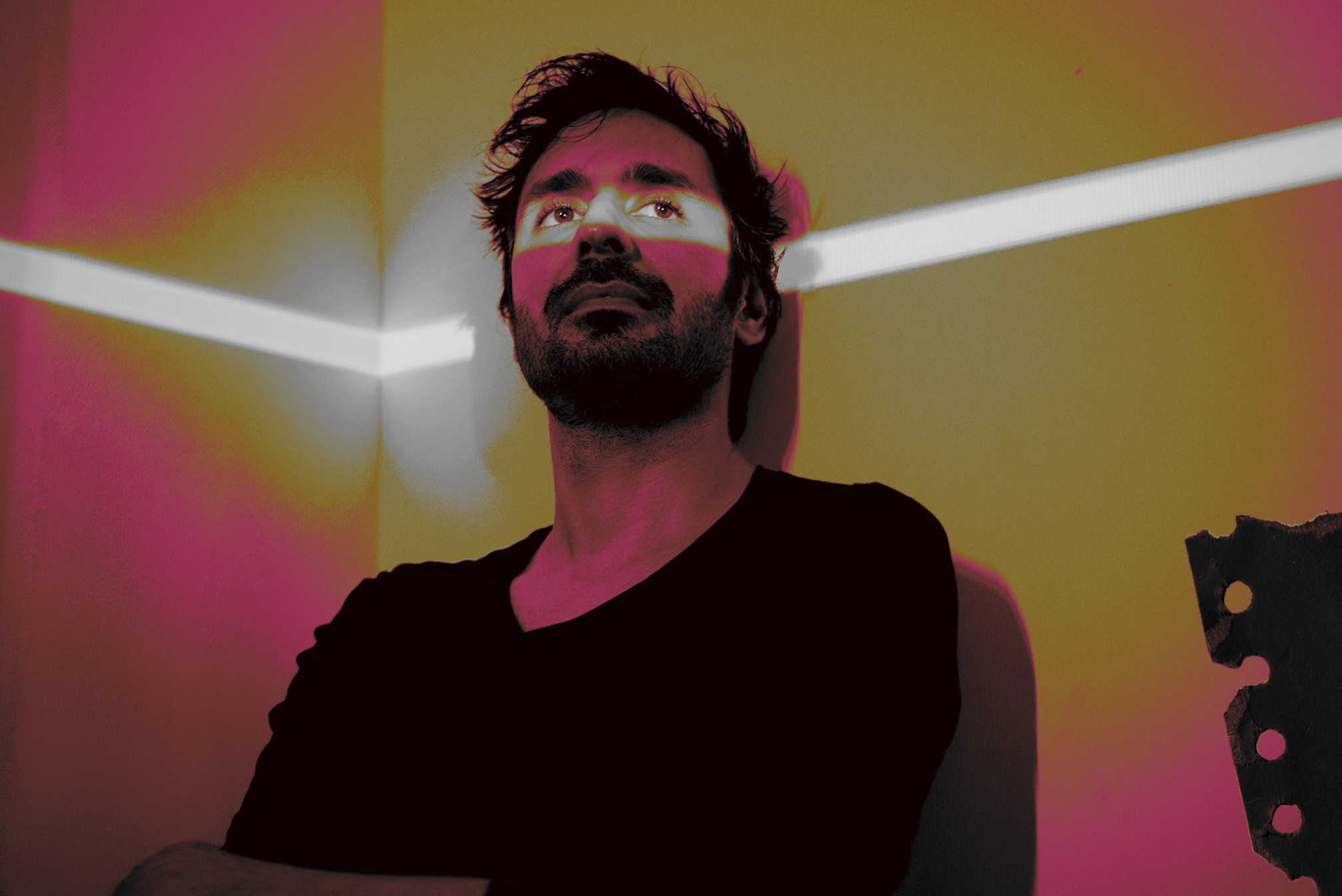 Interviews
Interviews
Dualist Inquiry's 'When We Get There' is a result of & reason for self-reflection
The independent artist's third studio album "deals with the passage of time".
Introspective moments don’t come easy — especially when your day to day routine involves mapping and actioning a macro-plan to unite underground music scenes across the world's most populated country.
That was the case for Sahej Bakshi, co-founder of game-changing music platform Boxout.fm — while it was in full swing, the trailblazing platform allowed Bakshi to grow his awareness of various facets of the industry by running a record label, events, streaming, and most importantly for him, community building. It took a brave step for the industry pioneer to pivot away from the big picture and focus on his own music career.
Outside of boxout.fm, Sahej is the independent artist known as Dualist Inquiry, who runs his own label Dualism Records. A producer, guitarist and composer with a curious tenacity for exploring new sounds, he’s never signed to another label and has earned his merits solely through his maverick-driven ethos on life and career. Both as an inspiring artist and propagator of the scene at large, Sahej Bakshi aka Dualist Inquiry has been an integral part of India’s underground music landscape.
In December, the Dualist showcased his riveting new live audio-visual performance at Magnetic Fields, and did the same at Lollapalooza India 2024 in January. The rejuvenated energy on stage is a result of keeping his head down and ears perked in the studio for the last few years.
It’s also a result of the introspective and creative unfoldings behind his third and latest album ‘When We Get There’. Tapping a variety of genres including UKG, breaks, experimental and electro, 'When We Get There' is brimming with optimistic and uplifting soundscapes, and built on themes of memory, family and love. An emotionally pivotal moment that stands out when listening through the album is the downtempo detour Bakshi takes with 'Mother', where he turns a nonchalant lo-fi aesthetic into a warm-hearted and nostalgic moment.
Sahej Bakshi aka Dualist Inquiry speaks with Arun Ramanathan about the inward journey to becoming a better version of himself and how Dualist Inquiry has musically evolved to "get there".
As a pioneer in the Indian alternative music scene, how did your journey as Dualist Inquiry begin?
I was exposed to electronic music for the first time when I was a music student at the University of Southern California in LA. Until then, I’d been a rock guy. We used to go to all these borderline illegal psytrance and electro raves in the greater Los Angeles area. When I was close to graduation, I decided to move back to India because I saw the potential in the scene back home. Looking back, the scene was really in its infancy back then, but it was a great move to come back and build my own career and the scene over here.
Despite achieving breakthrough success with your debut album and upcoming releases, you have chosen to remain an independent artist. Can you share your reasons for staying true to this path?
Part of this was due to circumstances — the label landscape in India in 2010 when I started was dominated by major labels that dealt primarily in film and commercial pop music. The independent scene was in its infancy, so we were building not only our own careers but also the audiences that would come to form the larger listener base for alternative music in India a decade later. I didn’t see the point in wading into the Indian mainstream with which I share little in common sonically, instead opting for a quality over quantity approach to building an audience.
Can you tell us about the core idea and process behind your new album, 'When We Get There'? How does it differ from your previous works?
The biggest difference for me between this album and my previous work is that this one is about and inspired by my actual life. To an extent, it’s always been that way but with this one, I felt some very strong themes at the forefront while writing. Some of those themes have to do with the passage of time, how the pages turn in different chapters of our lives and how sometimes we need to catch up to what’s already happened. It’s also about childhood, growing up and growing into the next version of yourself. It’s about waiting for and working towards wherever we want to be. Hence, 'When We Get There'.
Listen to 'When We Get There' below.
Despite achieving breakthrough success with your debut album and upcoming releases, you remain an independent artist. Can you share your reasons for staying true to this path?
Part of this was due to circumstances — the label landscape in India in 2010 when I started was dominated by major labels that dealt primarily in film and commercial pop music. The independent scene was in its infancy, so we were building not only our own careers but also the audiences that would come to form the larger listener base for alternative music in India a decade later. I didn’t see the point in wading into the Indian mainstream with which I share little in common sonically, instead opting for a quality over quantity approach to building an audience.
Over the years, you have cultivated a dedicated audience. How do you navigate bringing your new work to both your existing and new listeners?
That’s an interesting question because over the years I’ve often found myself tied up in knots over this question. While the essence of my “sound” hasn’t changed, it has evolved quite a bit, and so there is always the chance that an existing listener might find it too different, or that they may not like it as much as my older material. That’s totally fair in my eyes, and at the same time I have no choice but to keep moving forward and evolving as an artist. I can only hope that my listeners come along for the journey, but I also make an effort to not think about that while writing new music. One approach that’s really been working for me is to write music for an “audience of one”, and that one person is myself. It sounds selfish, but at the same time it also keeps me honest, which I believe is the most important thing when it comes to writing new music.
Can you tell us about your label, Dualism Records, and its role in supporting your artistic vision?
When I started my career in India in 2010, there weren’t any existing independent labels that aligned with my sound and vision. When things started to pick up for me and I was amassing a decently sized audience, it was almost a no-brainer to focus my efforts on building my own label. It means a lot to me to be able to retain ownership of my material and to be able to decide when and how it comes out, but that freedom and control does come at a price, which is the time, effort and budget required to run a label. All said though, it feels like it’s well worth it because in addition to my own music, I have plans to support and release other Indian artists who exist in the alternative electronic space.
Boxout.FM is known for its community-building efforts. How has being involved with this independent music community radio station influenced your career and connection with your audience?
Being involved with boxout FM, particularly in the early years when we started it in 2017, was a game changing experience for me in many ways. Both Dj Mocity (cofounder of boxout) and I felt the need to do something that enhanced the sense of community which we felt was missing in the Indian electronic scene at the time. Spending a lot of time in the boxout studios meant I got to see and hear more different kinds of alternative music than I’d ever heard before in my life until then. It was like a guided tour through the world of underground dance music and DJ culture, which also led to me taking DJing a lot more seriously. My time as a DJ also in turn had a great impact on my productions as they became more DJ-friendly and dancefloor-informed, so to speak.
How do you perceive the current homegrown electronic landscape in India? What excites you the most about it?
I feel like our scene is now in its adolescence. We’ve now got a homegrown crop of alternative electronic artists who’re pushing things forward with their individuality and creativity, and the really nice thing is that there are more festivals, stages and platforms than ever before to support them. The ecosystem isn’t fully developed yet, but is making strides every year. At the same time, we’re dealing with administrative and legal challenges that make it difficult and risky to organise a festival or large scale event. While it differs from city to city, electronic music in India exists in a tiny subculture which is misunderstood and shut down at worst, or ignored at the best. We don’t have much government or institutional support for this category of “the arts” (as opposed to Indian classical art forms), so whatever progress we’re making is because of a small group of determined individuals who are willing to take risks to do what they love.

You recently previewed your new A/V live set at Magnetic Fields and Lollapalooza 2024. Can you share some insights into the concept and experience of this live set?
The new A/V live set is based on my new album ‘When We Get There’, which comes out on 16 Feb ‘24. One of the key themes of this album deals with the passage of time, and how we reflect on and remember our lives and memories from the present moment. We all hold memories that are precious to us, and yet they seem to fragment and distort over time, until all we have is a little nugget that we hold onto. We wanted to find a method of creating visuals that would reflect this kind of nostalgia and fragmentation, and the extremely talented visual artists at Ocupus Studios came up with this technique of scanning real life spaces with a LIDAR-equipped camera and using those point cloud renders which looked quite trippy and fragmented, and then we animated the 3d camera flying through these point cloud renders . This technology is actually used for applications such as architecture, interior design and other spatially-oriented tasks but we took it and repurposed it to create our visuals.
What are some of the key influences and inspirations that have shaped your evolved sound as Dualist Inquiry?
Some of the biggest influences that influenced my sound on the new album have been Caribou, Four Tet, Overmono, Jon Hopkins, Rival Consoles, Max Cooper and Tycho, among others. On a larger, lifelong scale artists like Daft Punk, Moby, Fatboy Slim and The Propellerheads shaped my taste in music at a young age.
Can you discuss the significance of authenticity and personal growth in your artistic journey?
For the last few years, my primary goal has been to tap into the most personal and authentic space possible while writing new music. Because I write mainly instrumental music, it’s possible to write music for a mood or groove which isn’t particularly personal in nature. But that changed when I started writing ‘When We Get There’. The last few years have been very eventful for me — turbulent, exciting, anxiety-inducing and exhilarating in turns. I also ended up taking a hiatus from making music and playing gigs because of the pandemic and then the birth of our daughter in 2022. This actually gave me the kind of quiet space and time I needed to really dive into the depths of my emotional landscape. What came out of it is an album that doesn’t just exist alongside my personal growth — it was actually a personal diary that chronicles some of the highest and lowest moments I’ve experienced in the last few years. It feels a lot more tightly integrated with my actual life, which is a special feeling.
How do you balance your roles as a producer, DJ, and music entrepreneur?
The roles of producer and DJ actually dovetail into each other in the most perfect way for me. When I’m DJing or digging for my DJ sets, I get to explore and educate myself on the landscape and history of dance music. I listen to large volumes of music from the listener’s perspective. What that means is that I’m not trying to reverse engineer or otherwise pick apart what each song does, I’m just closing my eyes and imagining how it would feel to hear it on the dancefloor. That’s basically my litmus test to determine whether a song makes it into the crate or not. And then when I come back to producing new music, I find those explorations to be invaluable because I I have so many ideas that are inspired by the music I heard and played as a DJ. Managing the entrepreneur side of things can be a bit tricky and less organic because that work is so different and left-brained in its nature. However, as an independent artist, I consciously need to make the time to spend on administrative, label and release-related tasks — I feel like on some level all independent artists need to wear multiple hats at the same time.
What advice do you have for aspiring artists who are looking to establish themselves in the electronic music industry?
Find your heroes and study and imitate them until you’ve gotten good enough to make your own sound. Then stick with that sound or approach even if it’s not the trendy thing at the moment. Be proactive in your outreach, let the gatekeepers and industry folks know you exist and are keen to work. Focus on your craft and give it the respect, space and time it needs for you to start to master aspects of it. Prepare for the opportunities you don’t yet have because when the chances come, they tend to come so fast that readiness becomes key. Treat social media with caution while using it to your advantage — musicians are not the same thing as influencers/content creators and it’s easy to forget that in today’s social media jungle.

Can you share some memorable experiences or collaborations you've had playing alongside artists such as Bonobo, Fatboy Slim, and DJ Shadow?
One of my most treasured and memorable experiences happened just a few weeks ago. I’d just gotten off stage at Lollapalooza Mumbai and had barely oriented myself when I saw Dan Snaith walking up to me with a big smile on his face. He told me he watched my entire show (I was playing right before Caribou) and that he enjoyed it. That would have been enough to make my day/month/year, but after that, I got to spend quite a bit more time chatting with him backstage, and the icing on the cake was getting to share a cab with him from the festival to the afterparty where he was playing as Daphni. We had some great conversations and it really meant the world to me to get to meet one of my all-time heroes, and for him to turn out to be one of the kindest, most genuine and warm people ever. I consider Dan to be a role model not only musically, but also with regard to the grace, humility and skill that he embodies.
How do you approach the creative process when producing music versus DJing?
When I’m producing, I’m trying to write something that hooks onto or relates to a thought, feeling or emotion in my inner world. It’s like transcribing music by ear. You’re listening to something that has no form or boundaries and are trying to put it down on paper (or software, in my case). With DJing, it's the opposite — each new song is like a pebble that I throw into my musical pond, and each one interacts with it in a different way. Some skip across, some sink to the bottom and join the other pebbles which form the bedrock of my musical world.
In addition to your music career, you've also embraced the role of a mentor. What motivates you to support and nurture the next generation of artists?
The way I see it, mentoring artists is actually a mutually beneficial experience for both myself and the artist being mentored. In order to give good advice or guidance, one needs to reflect and really think about what one has learned over the years. It also gives me an opportunity to connect with and form meaningful relationships with the next generation of artists, and more often than not, I end up learning something new myself..
Are there any specific tracks or moments from your new album that hold a special significance to you? Why?
There are a few tracks on the album that hold special significance for me. I wrote the first three songs on the record on a single weekend in December 2022, and that was when I knew that I finally had an album in the works. Those three songs were 'When We Get There', 'Coming Alive' and “Days Away', and they’re also the first three tracks on the album for that reason. It was a really special moment for me because the sonic and emotional palette of the album emerged after a lot of hard work and patience. Every other song on the album is there because they also have their own significance but these three are special to me because they started the process.

How do you see the future of the Indian electronic music scene evolving, and what role do you hope to play in it?
I hope to see the electronic music scene in India evolve into a more community-driven, grassroots and egalitarian scene. Currently, the electronic dance music scene in particular is mostly concentrated in the major cities and the people who attend these gigs tend to be relatively privileged, well-travelled and financially comfortable. While this is a perfectly good starting point for our scene, I feel like the scene here needs to grow beyond being a faithful recreation of what we see in the EU or US. In order for it to come into its own, the art needs to adapt and grow in a way that reflects its actual journey in India. That means more homegrown artists with their unique voices that reflect their cultural reality, and an ever-growing audience that “gets it” and is willing to support non-commercial art. It’s a tricky situation because there are many Indias that exist in parallel to each other and have very little overlap with each other — in all honesty I’m not sure how this can be achieved with underground dance music but one can only hope. For my part, I’m going to stay focused on releasing my music which I think is left-of-centre-but-still-accessible in the hopes that I can be the entry point for my audience into the rest of the world of electronic music.
Can you share any upcoming projects or collaborations that you're particularly excited about?
Now that 'When We Get There' is almost out, I feel like I’ve arrived at a clearing with a lot of interesting opportunities that I plan to make the most of. Without getting into specifics (because it’s so early in the process), there are some really exciting cross-border collaborations in the works, as is the development of my next release, most likely an EP later this year. There’s a lot that will reveal itself as we move forward, so fingers crossed!
How do you maintain a sense of balance and well-being while juggling various aspects of your career?
I find that having a well-balanced and healthy personal life outside of work is by far the most important thing for me to maintain a well-functioning career. Having a close-knit community of artist friends who I can trust to give me constructive critical feedback, a wholesome and balanced family life with my wife and daughter, making an effort to grow friendships outside of the music scene, living in a green non-urban environment, eating well, exercising, getting good sleep as much as possible. These are all my non-negotiables when it comes to giving myself the best shot as an artist.
Looking back at your journey so far, what are some of the most valuable lessons you've learned as an artist and entrepreneur?
Oh my gosh, there are so many, haha! But I’ll try to share the handful that to come to mind:
1. Nurturing and developing what I call “The Craftsman Mentality”. This entails having respect and reverence for your craft, and making daily efforts to improve your skills and capabilities with the tools that are at your disposal. You’ve got to dedicate a set amount of time every day to your craft, whether it’s art, music, fashion, filmmaking or anything else that requires creativity. Showing up to work every single day is the most important thing — a lot of times it won’t go well but eventually, it will.
2 In every situation, there are factors which are in your control and a lot of variables which are completely out of your control. Work with what’s in your control and try not to think too much about what’s outside your control.
3. Go out of your way to get constructive feedback and criticism. My personal rule is to only take such feedback from other creatives who are currently active in their respective fields, and not from someone who isn’t actively putting themselves out there in some way.
4. If you find yourself blaming your lack of ideas or creative progress on a lack of gear or equipment then my advice would be to rethink that thought process. All we really need to make electronic music is a laptop, midi controller and decent headphones/speakers. Every single time I’ve been stuck in a creative rut, new gear has never been the answer. Finding new perspectives and learning to be creative within constraints holds a lot more promise, in my opinion.
Dualist Inquiry 'When We Get There' is out now on Dualism Records. Listen here.


